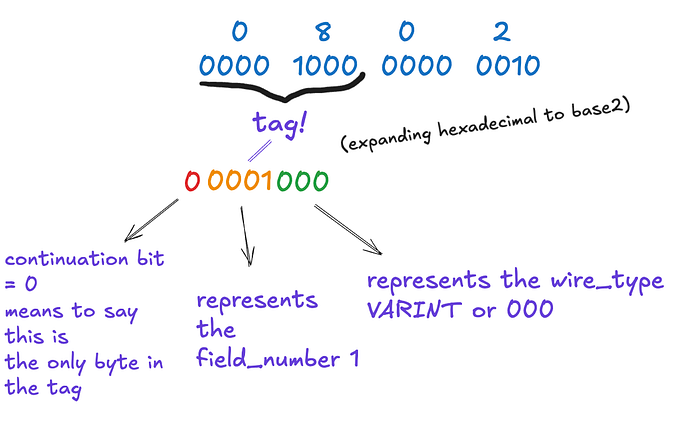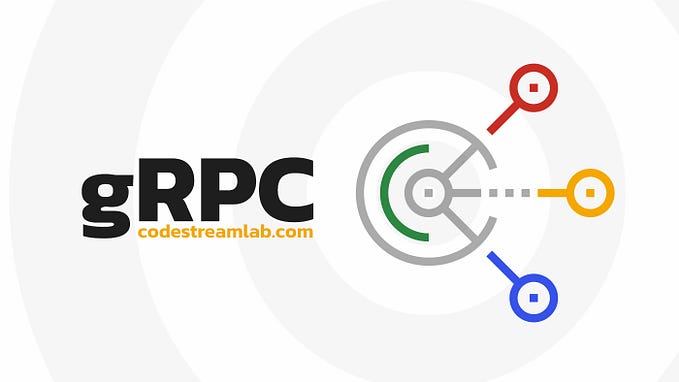
Protobuf and gRPC
Protobuf (Protocol Buffers)
“Protocol Buffers are language-neutral, platform-neutral extensible mechanisms for serializing structured data.”
To put it simply, Protobufs aka Protocol Buffers are methods of storing and transporting data like XML and JSON, but in an efficient and faster way.
Why is Protobuf useful?
- Provides serialisation format for packets for typed/structured data
- In-built support for types and validation
- Lesser boilerplate code
- Faster transmission than counterparts such as XML and JSON as data is transmitted in binary format and takes less space and bandwidth
How does Protobuf work?
- Protobufs are invoked on build time to generate code in the target programming languages
- Each generated class contains an accessor for each field and methods to serialise and deserialise to and from raw bytes

Defining a Proto
// Specify Syntax (Default "proto2")
syntax = "proto3";
// User Model
message User {
int64 id = 1;
string name = 2;
string email = 3;
optional string address = 4;
}- Syntax: This defines the syntax which is used by proto.
proto2is the default syntax. - Message: The
Usermessage specifies fields (name/value pairs), for all the data that needs to be transmitted. Each field has a type, name and field number.
Compiling Proto
For compiling the Proto, we will need to install protoc.
Once this is done, we can use the below command to generate the corresponding models for the User message in Golang.
protoc --go_out=. *.protoThis will generate a user.pb.go which will contain Getters and Setter for the User struct.
Testing Proto in Golang
- Install protobuf dependencies in Go
go get github.com/golang/protobufproto.Marshal(user)—Marshalmethods return the marshalled / wire format encoding of the message
user := &pb.User{
Id: 1,
Name: "John Doe",
Email: "johndoe@gmail.com",
}
userMarshalled, _ := proto.Marshal(user)
log.Println("Marshalled Proto : ", userMarshalled)proto.Unmarshal(userMarshalled, &user1)—Unmarshalmethod decodes the raw message bytes and stores it in the finaluser1struct
user1 := pb.User{}
proto.Unmarshal(userMarshalled, &user1)
log.Println("Unmarshalled Proto : ", &user1)
gRPC
gRPC is a Remote Procedure Call (RPC) framework that can run in any environment with support in multiple languages such as Java, Python, Go. gRPC uses Protobuf as its underlying exchange format.
How is gRPC useful?
- Remote Procedure call allows applications to call methods on different applications as if they were a local object.

- gRPC allows to define Message and Service types using Protobuf and generates code for any supported language
Setting up a gRPC Server and Client
- Installing
grpcdependencies
go get "google.golang.org/grpc"- Create the
user.protofile containing the Message Definition
syntax = "proto3";
option go_package = "/proto";
message User {
int64 id = 1;
string name = 2;
string email = 3;
optional string address = 4;
}
message UserId {
int64 id = 1;
}- Now, we need to define the RPC calls in
user.proto-CreateandGetUser.
service UserService {
rpc Create(User) returns (User){};
rpc Get(UserId) returns (User){};
}- Compiling the Proto will generate a
user.pb.go(containing struct definitions for User and UserId) anduser_grpc.pb.go(containing method definitions of theRPCmethods)
protoc proto/*.proto --go_out=./ --go-grpc_out=./- Creating a gRPC server.
func main() {
listener, err := net.Listen("tcp", ":8080")
if err != nil {
panic(err)
}
// Create a gRPC Server
grpcServer := grpc.NewServer()
pb.RegisterUserServiceServer(grpcServer, &server{})
if err := grpcServer.Serve(listener); err != nil {
log.Fatalf("failed to serve: %v", err)
}
}
type server struct {
pb.UserServiceServer
}- Setting up a gRPC Client and Testing
func main() {
conn, _ := grpc.Dial("localhost:8080", grpc.WithTransportCredentials(insecure.NewCredentials()))
client := pb.NewUserServiceClient(conn)
created, _ := client.Create(context.Background(), &pb.User{
Name: "Sample User",
Email: "sample@gmail.com",
Address: proto.String("21 Symphony Apartment"),
})
fmt.Printf("Created User with Id - {%d}\n", created.Id)
user, _ := client.Get(context.Background(), &pb.UserId{Id: created.Id})
fmt.Printf("Found User - {%s}\n", user)
}
Since there is no implementation for Create and Get methods yet, the server replies with an error.
- Implement
CreateandGetRPC methods on the server
func (s *server) Create(ctx context.Context, user *pb.User) (*pb.User, error) {
userTable := DB.Table("users")
userTable.Create(user)
return user, nil
}
func (s *server) Get(ctx context.Context, userId *pb.UserId) (*pb.User, error) {
user := pb.User{}
tx := DB.Table("users").Find(&user, userId.Id)
if tx.RowsAffected == 0 {
return nil, errors.New("user not found")
}
return &user, nil
}- Now the client should be able to able to process the requests

Feel free to check the code for more details on Github




